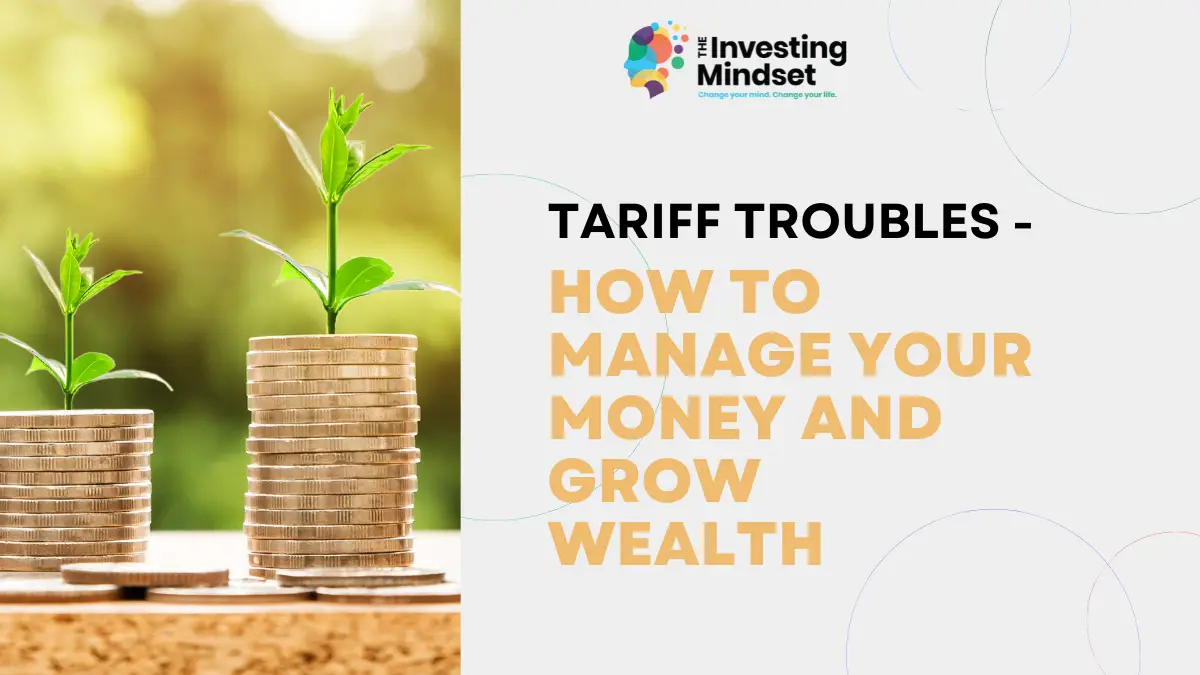In early 2025, the U.S. government introduced sweeping global tariffs. While experts anticipated a policy shift, few expected the speed and widespread impact on everyday families. We’ve officially entered the era of rising costs — where goods and services, especially those traded internationally, come with an added price tag.
At The Investing Mindset, we believe these tariffs could trigger a modern trade war, much like the one from the 1930s. History teaches us that trade wars often lead to economic slowdowns, rising unemployment, and financial pressure on households. But here’s the good news. Times of challenge can also bring opportunity.
As Warren Buffett, the “Oracle of Omaha,” wisely puts it:
“Be fearful when others are greedy, and be greedy when others are fearful.”
Downturns can be the best times to find investment bargains. If you’re prepared, you can come out stronger and wealthier.
I’ve personally weathered the 2001 post-9/11 recession and the 2008 financial crisis. These experiences taught me a powerful lesson: tough times are the best training ground for financial resilience.
This five-part blog series will help you understand how tariffs impact your wallet — and show you how to respond wisely. Each part will explore real-life scenarios and practical steps you can take to stay ahead.
Part 1: Why Everyone’s Talking About the 2025 Tariffs — And What They Mean for You
Let’s break it down.
Tariffs are like tolls on goods crossing borders. When products like electronics, clothes, or groceries are imported, they now come with extra fees. And guess who pays in the end? You do — at the checkout counter.
Real-Life Example:
You walk into your usual grocery store and grab your favorite cereal. It used to cost $6. Now it’s $8. That’s not a fluke — it’s likely the result of new tariffs.
Planning to buy a new car? You might pay 10% to 25% more depending on where it was manufactured. A compact SUV that used to cost $35,000 could now cost $40,000.
How This Affects Your Financial Independence
When prices go up on essentials like food, cars, and electronics, you’re left with less to save and invest. That means slower progress toward financial freedom.
But you’re not powerless. You can take smart steps right now.
Step 1: Analyze Your Expenses
The first move is simple but powerful: track your expenses. This helps you clearly separate:
Fixed Expenses — these are predictable and repeat monthly:
- Rent or mortgage
- Insurance premiums (health, auto, life)
- Loan payments
- Subscriptions (Netflix, gym, etc.)
- Property taxes
- Retirement contributions
These are non-negotiables — but you should still review them regularly for possible savings.
Variable Expenses — these change from month to month and include:
- Groceries
- Utilities
- Fuel or public transit
- Medical bills
Discretionary Spending — these are non-essentials that we often overspend on:
- Dining out
- Entertainment
- Hobbies and gadgets
- Clothing and accessories
This is where most of the savings magic can happen.
From my own experience, variable and discretionary expenses are often the financial leaks. We get emotionally attached to certain habits — like weekly dining out or impulse buying. I have a friend who easily spends thousands on shoes and watches. Sound familiar?
Step 2: Track and Trim
Once you’ve identified your spending patterns:
- Look for what you can trim back
- Set spending limits
- Use free tools like budgeting apps or worksheets to help
Small cuts in your variable expenses can lead to big gains in your savings. That’s the money you can redirect to investing and building your future.
Final Thoughts
Recessions and tariffs may seem scary, but they can become stepping stones. What matters is how you respond. This isn’t about fear. It’s about being informed, prepared, and confident.
Don’t just follow the headlines — take control of your finances.
📬 Subscribe to The Investing Mindset Newsletter and get:
- Weekly money tips
- Smart strategies to beat inflation
- A free downloadable guide to mastering your budget
👉 Click here to subscribe now and grab your free guide.
Let’s grow wiser and wealthier together.




